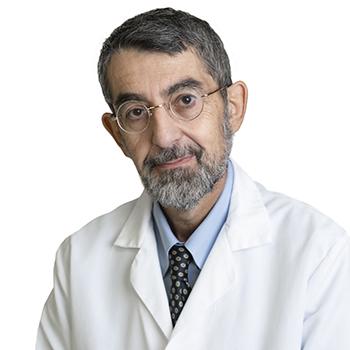CONTACT
Letisia Marquez
626-476-7593
lemarquez@coh.org
LOS ANGELES — Alberto Pugliese, M.D., has joined City of Hope as the Samuel Rahbar Endowed Chair in Diabetes & Drug Discovery, chair of the Department of Diabetes Immunology, and director of The Wanek Family Project for Type 1 Diabetes within the Arthur Riggs Diabetes & Metabolism Research Institute.

Pugliese has dedicated his 35-year career to studying type 1 diabetes from the preclinical period to the clinical diagnosis and, afterward, the setting of transplantation. His work has contributed to a greater understanding of genetic and cellular mechanisms that regulate immunological self-tolerance, specifically to molecules targeted in diabetes. Pugliese has provided seminal contributions in the field of type 1 diabetes genetics, immunology, pathology and clinical trials, and his work has been published in major international journals.
“City of Hope is fortunate to welcome Dr. Pugliese as he shares our dedication to advancing type 1 diabetes research through scientific excellence, open collaboration and the training of new investigators,” said Debbie C. Thurmond, Ph.D., director of the Riggs Institute and Ruth B. & Robert K. Lanman Chair in Gene Regulation & Drug Discovery Research.
Pugliese comes to City of Hope by way of the University of Miami, where he served as The J. Enloe and Eugenia J. Dodson Chair in Diabetes Research. He was also a tenured professor of medicine, Division of Diabetes Endocrinology and Metabolism, and a professor of microbiology and immunology, as well as serving as deputy director for Immune Tolerance Research at the Diabetes Research Institute, Leonard Miller School of Medicine, University of Miami.
“I am humbled and honored to join City of Hope’s legendary diabetes research department that has made pivotal discoveries about diabetes for more than 50 years,” Pugliese said. “My team and I will continue and enhance that spirit of innovation and scientific pioneering, digging deeper into the secrets of genetics and the immune system, metabolism and diabetic complications.”
A native of Italy, Pugliese earned his medical degree and postdoctoral research fellowship at the University of Palermo. He completed postdoctoral research fellowships at that university, and then trained with the late George Eisenbarth at the Joslin Diabetes Center at Harvard Medical School and the Barbara Davis Center for Childhood Diabetes at the University of Colorado Health Sciences Center.
Pugliese is a champion of collaboration and team-science approaches, which has been recognized by the Helmsley Charitable Trust with the George S. Eisenbarth nPOD Award for Team Science. He has served on research grant review committees of the National Institutes of Health (NIH), the JDRF and other funding organizations internationally. He also served as chair of the American Diabetes Association’s Grant Review Panel. He has been a steering committee member of the Type 1 Diabetes TrialNet, a clinical trial network funded by the NIH, under which auspices he has chaired several committees and initiatives.
Pugliese is also executive co-director of the JDRF Network for Pancreatic Organ Donors with Diabetes (nPOD), a collaborative project that recovers tissues from organ donors with type 1 diabetes and distributes samples to investigators worldwide to support a comprehensive understanding of the disease.
# # #
About City of Hope
City of Hope's mission is to deliver the cures of tomorrow to the people who need them today. Founded in 1913, City of Hope has grown into one of the largest cancer research and treatment organizations in the U.S. and one of the leading research centers for diabetes and other life-threatening illnesses. As an independent, National Cancer Institute-designated comprehensive cancer center, City of Hope brings a uniquely integrated model to patients, spanning cancer care, research and development, academics and training, and innovation initiatives. Research and technology developed at City of Hope has been the basis for numerous breakthrough cancer medicines, as well as human synthetic insulin and monoclonal antibodies. A leader in bone marrow transplantation and immunotherapy, such as CAR T cell therapy, City of Hope’s personalized treatment protocols help advance cancer care throughout the world.
With a goal of expanding access to the latest discoveries and leading-edge care to more patients, families and communities, City of Hope’s growing national system includes its main Los Angeles campus, a network of clinical care locations across Southern California, a new cancer center in Orange County, California and Cancer Treatment Centers of America. City of Hope’s affiliated family of organizations includes Translational Genomics Research Institute and AccessHopeTM. For more information about City of Hope, follow us on Facebook, Twitter, YouTube, Instagram and LinkedIn.